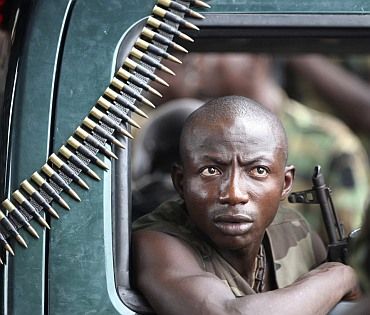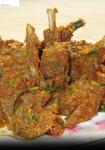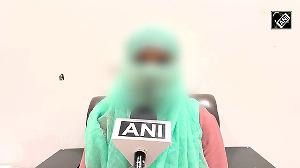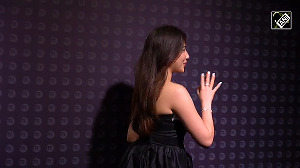Boko Haram, the extremist Islamic group that recently abducted over 200 girls in Nigeria, roughly translates to 'fake (Western) education is sinful'. The title could be misleading as the group not only condemns Western education but also wants an extension of the Sharia all over the country, says Confidence Uwazuruike. The recent spate of bombings and kidnappings in Nigeria has generated international condemnation of the Islamist militant group Boko Haram.
The recent spate of bombings and kidnappings in Nigeria has generated international condemnation of the Islamist militant group Boko Haram.
The outfit abducted over 200 girls in the Maiduguri state of Northern Nigeria about three weeks ago. The group has also bombed the Nyanya district of Nigerian capital Abuja twice in the last month.
While this might be surprising to a foreign audience, the activities of this group are not new to Nigerians.
Mohammed Yusuf, who founded the group in 2002, was killed in 2009 by the Nigerian police although he was captured alive and interrogated.
The police claimed he was shot while attempting to escape from detention.
Not many believe this claim.
Boko Haram roughly translates to 'fake (Western) education is sinful'. The title could be misleading as the group not only condemns Western education but also wants an extension of the Sharia all over the country.
The population of Nigeria is roughly evenly divided between Muslims and Christians.
While the dominant religion in Northern Nigeria is Islam, the South is predominantly Christian.
Since the country's return to democracy in 1999, most northern states have adopted the Sharia law.
Some have argued that Boko Haram is a political problem and has nothing to do with religion.
This view, however, would be looking at one side of the picture.
It has been alleged (external link) that 90 of the recently abducted girls are Christians. And most of the girls that have 'escaped' are Muslims. Also, most of Boko Haram's acts have been targeted at churches.
Boko Haram also has political ideologies although it is rooted in religion.
Nigeria's foremost writer, social commentator and Nobel Laureate, Wole Soyinka, described (external link) the group as 'a bunch of homicidal maniacs motivated by a particular virulent strain of a world religion'.
Soyinka also claims that 'some politicians were behind the very beginning of Boko Haram' and that 'they (politicians) were using, distorting and bastardising religion for political ends.'
He seems to be referring to political events before the 2011 elections in Nigeria that saw the emergence of a Christian president from a minority tribe in the South.
Current Nigerian President Goodluck Jonathan became president after Umaru Musa Yar'Adua died in office.
Jonathan is from the Christian South while Yar'Adua was from the Muslim North.
At the time, there was opposition to his proposal to stand for the next elections.
Northern politicians quoted a seemingly non-existing internal party policy that accounted for rotational presidency, claiming that the North had not completed its eight-year tenure.
During this period, eminent northern politicians made several inciting statements which can be linked to a rise in insurgency in the North immediately after Jonathan won. Former vice-president Atiku Abubakar said: 'Those who make peaceful change impossible will make violent change inevitable.'
General (retd) Muhammadu Buhari, the presidential candidate of the major opposition party CPC and an eminent northern personality, also made various inciting statements and was heavily linked with the post-election violence in parts of the North.
In 2012, he said: 'If what happened in 2011 (alleged rigging) should happen in 2015, by the grace of God, the dog and the baboon would all be soaked in blood.'
Soon after the elections, almost in line with northern politicians' predictions of an ungovernable country for President Jonathan, Boko Haram bombed the police force headquarters and the United Nations building.
There were several other attacks, including a well-coordinated bombing of four churches in Abuja on Christmas day. The scale of these attacks was unprecedented and raised concerns of a possible affiliation of the sect with Al Qaeda's North African wing.
In October 2012, a serving member of parliament, Senator Ahmed Khalifa Zanna, was arrested for alleged links with Boko Haram.
Senator Ali Ndume and ex-Borno state governor Modu Sheriff were also put under police surveillance.
The president claimed that Boko Haram had infiltrated his government and that was making the fight against the sect difficult.
However, there have been several attempts to curb the activities of the sect, including an offer of amnesty by the government.
Currently, a state of emergency is subsisting in Borno and two other northern states.
This move has also been met with criticism, especially from current leading opposition, the All Progressives Congress.
A few weeks ago, the governor of Adamawa state Murtala Nyako addressed a letter to the governors of the 19 northern states.
In his letter, Nyako claimed that President Jonathan's administration was fostering ethnic cleansing in the region while claiming to curtail the Boko Haram insurgency.
Until the recent Abuja bombings, it seemed the state of emergency had restricted the activities of the insurgent groups. The bombings, however, seem to advocate for improved methods of tackling the group.
The kidnapping of school girls is a first in the group's method. And this is giving them the international publicity that they crave.
Recent attacks have been at young students whom usually they line up and shoot. The United States and Britain have offered to assist Nigeria in this new phase.
Hopefully, this latest action of the sect will be their last.
Confidence Uwazuruike, a Nigerian student doing his master's in journalism at Bournemouth University, the UK, is currently interning at Rediff.com
This coverage is part of Project India, a journalism initiative organised by Bournemouth University, the UK, and supported by Rediff.com







